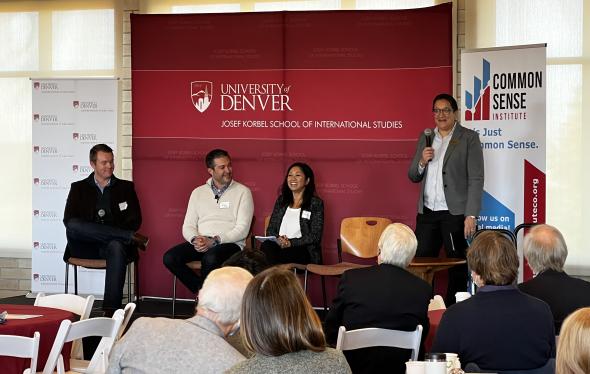Scrivner Institute hosts first Scrivner Policy Roundtable
On November 3, the Douglas and Mary Scrivner Institute of Public Policy hosted the inaugural Scrivner Policy Roundtable. This new recurring event series aims to build a network and collaborative research and learning environment among local policy organizations. Each roundtable features a presentation by a roundtable member on a specific element of their policy work, followed by a facilitated, robust discussion on the policy issue at hand. Our first roundtable was hosted at the Korbel School, with over 50 people in attendance, including faculty, staff, and students from across the University of Denver and representatives from over 10 local policy organizations. Local policy think tank Common Sense Institute (CSI) presented findings and recommendations from their recent report on housing affordability in Colorado, a pressing issue across the state that the pandemic has only exacerbated.
Dean Fritz Mayer of the Korbel School opened the event by emphasizing the importance of such events that foster network-building, critical thinking and civil discourse among the policy community. Director of the Scrivner Institute, Dr. Naazneen Barma, introduced the concept of the Scrivner Policy Roundtable and its aim to create a collaborative network of local policy organizations and facilitate robust dialogue around local policy issues and policy approaches. Common Sense Institute President & CEO Kristin Strohm reiterated these sentiments: “Our goal is to bring talented policy minds together to bridge those divides...to come up with real solutions to impact Colorado for years to come.”
The roundtable presenters were CSI’s 2021 Terry J. Stevinson Fellows, Evelyn Lim, the Director of Policy & Research at the American Cornerstone Institute, and Peter LiFari, the Executive Director of Maiker Housing Partners. They discussed the findings of their study conducted to identify key issues and solutions to Colorado’s housing crisis. When introducing the report, LiFari highlighted the benefits of interviewing forty plus housing experts across Colorado - “it was an opportunity to break out of [our] echo chamber and get out of the pull of group think...because of this [we] really came together and said ‘what can we really get done?’” Throughout the presentation, Lim and LiFari outlined the benefits to deconstructing binary thinking when approaching housing issues and addressed hot topic issues such as inclusionary zoning, no growth policies, and the debate over standardized building codes. Before ending their presentation, they were joined by Colorado State Representative Colin Larson (District 22) to provide his perspective on the issue of housing affordability and opportunities for the state legislature to make an impact.
The presenters ended on a hopeful note with their “Blueprint for Transformational Change” as they described investing in construction and financing innovations and collaboration with local governments as keys to success in solving Colorado’s housing issues. “We can’t come to a solution if we’re unwilling to come together in the middle,” said Lim, “when you’re doing policy, it is also about how well you can execute on behalf of everybody.” Following their presentation, attendees engaged in a thoughtful and robust Q&A, offering different perspectives and approaches. Key topics that were addressed in the discussion included the impact of short-term rentals on the housing market, TABOR’s role, impact fees, increasing square footage of new builds, and the methodology and assumptions underlying the research for the report.
Subsequent roundtables will feature other local policy organizations and their work on pressing policy issues, offering attendees the opportunity to learn about and engage in critical discussion on the work being done on these issues at the state and local levels. The next roundtable will be held in the winter 2022 quarter.
The Douglas and Mary Scrivner Institute of Public Policy at the Josef Korbel School of International Studies is an interdisciplinary hub for education, research and dialogue that addresses today’s most crucial policy issues with a global to local perspective and an emphasis on practical solutions. For a full calendar of events, and to learn more about the Institute, please visit their website.
Written by: Graduate Assistant Kati Stemple, with contributions from Katie Aker, Scrivner Institute Program Manager, and Naazneen Barma, Scrivner Institute Director



